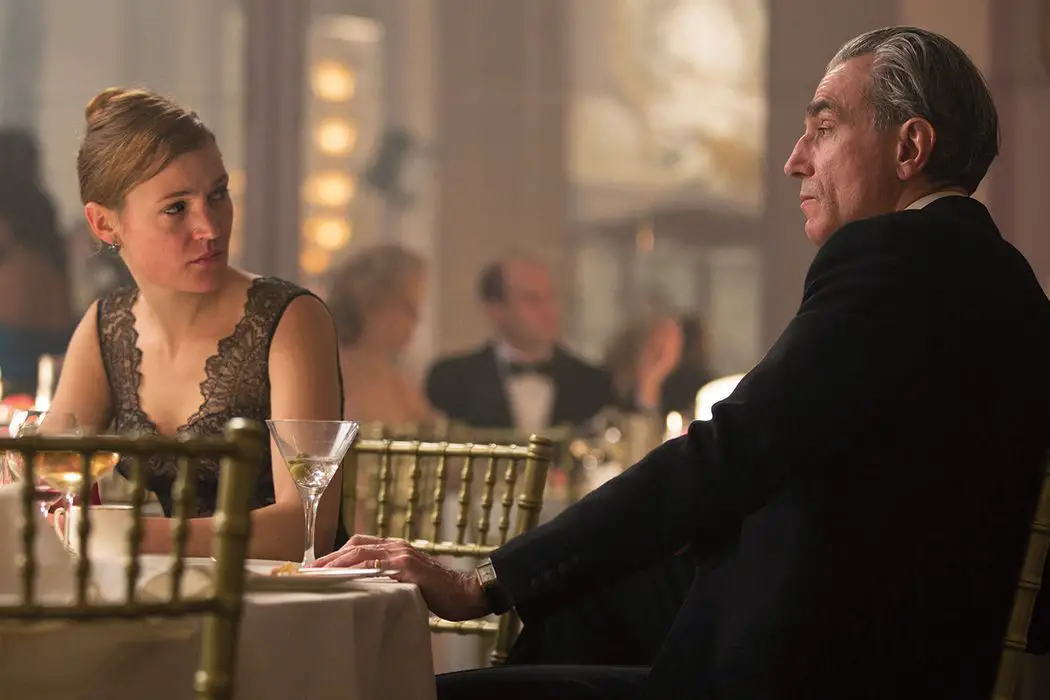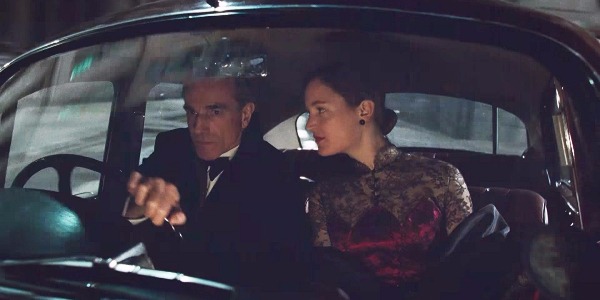There’s Something Missing From PHANTOM THREAD

Alex is a film addict, TV aficionado, and book lover.…
A new Paul Thomas Anderson film perks up almost any cinephile with its promise of a dense, gorgeous piece of work to be ripped apart and studied. The auteur is a preeminent member of today’s film world, and after the relative disappointment of Inherent Vice, fans were especially hungry for a new offering.
As news about Phantom Thread trickled out, it gave people a lot to be excited about. It teased a lavish world of 1950s fashion, the return of Daniel Day-Lewis as a myopic perfectionist, and the introduction of a new face that upsets a delicate balance. Other than that details were pretty scant, so when the film finally dropped it wasn’t surprising to see a variety of takes. Anderson’s films are often pretty opaque thematically, and Phantom Thread doesn’t disappoint in that regard. Still, what spilled out wasn’t just a debate over what the film was about but different opinions on genre that left the broad reaction difficult to summarize.
I experienced the disparate reactions personally, as the first time I saw Phantom Thread I keyed in on the difficult, suffocating artist portion and found myself angrily sweating through a narrative I thought irksome. The second time around I was intrigued by the power dynamics, the shifting relationships, and most surprisingly, occasionally chuckling at Day-Lewis’ fussy Woodc*ck.
Still, even through this second and much less damp outing, a stealthy problem ate away at my enjoyment. None of the angles Anderson was exploring were fully satisfying because the film was too myopic itself. Anderson had only made Woodc*ck a complete character, and the bits missing from Vicky Krieps’ Alma, Lesley Manville’s Cyril, and the overwhelmingly female side characters had left the film open to misinterpretation and disappointment.
No World Outside Woodc*ck
Day-Lewis is excellent, as expected, as the domineering dressmaker at the head of the House of Woodc*ck, and it’s true that the film is intended to be almost suffocatingly about him. The number of scenes without his character can be counted on one hand, and even when he is absent, everyone is still talking about him. Because of this, the audience understands his ticks, his desires, and the moments that led him to where the film picks up.

Unfortunately, no other character is given the same treatment, and that’s not for lack of opportunity. Cyril, his sister and seemingly lifelong business partner, could easily have her choice to stick with him addressed when he ruminates about the past, and Alma’s introduction as an infatuated and clumsy waitress almost begs for further explanation.
But the problems really stem from the more subtle ways these characters are sidelined. Both of them spend the film engrossed in Woodc*ck’s business and guiding him away from self destruction, but they also never display their own vision for anything. At best, they tell Woodc*ck what they like and don’t like about what he has done, forever reacting to Woodc*ck instead of being truly active. Surely Cyril, who has been a part of this world for as long as Woodc*ck, would’ve formed her own opinions? And Alma, who can allegedly outstare the man and is bold enough to have a flirtatious note ready after a single breakfast order, would’ve been living a life not so easily abandoned?
These are holes Krieps and Manville almost fill in with their withering glances and silent standoffs, but they cannot change the inherent structure of the film, which doesn’t give them enough room to really spread their wings. These are clipped characters, and no amount of standing up to Woodc*ck can hide that.
Faltering Genres
Now, this deficiency doesn’t inherently doom Phantom Thread. Many great films shortchange characters, but Anderson is an ambitious artist. A cursory analysis of the staging, music, and overall presentation shows that he’s going for an ever shifting story, and most of the ways people have classified this film are present to one degree or another. Comedy, horror, romance, it’s all there, and I’m sure someone will eventually map out how Jonny Greenwood’s ubiquitous score leads us through it all.
If I had to place my finger on the primary genre Anderson was going for, I would have to say romance, which also happens to be the most fatally flawed. The slightness of Alma’s character makes it difficult to buy that Woodc*ck is actually falling for her because she doesn’t really exist, and in fact, the film leaves wide open the suggestion that he, Alma, and even Cyril are more in love with their art instead of each other.

Alma is presented as a blank canvas of sorts, with almost no background filled in throughout the film, and that seems to be an intentional nod to the need for a dressmaker to have a body to work with. As Cyril informs her after her initial measurement session, Alma’s body is precisely the type Woodc*ck likes, a moment that reduces her to an ingredient in Woodc*ck’s creations. This could be taken as a simple display of dominance by Cyril, except nothing in the film really proves that assertion wrong.
Woodc*ck only ever loves women in relation to his art, from his musings on his mother (which revolve entirely around him making her wedding dress), the princess who shares his taste in fashion, and Cyril and Alma, who devote themselves fully to enabling him to create great work. Think back to Alma’s voiceover at the end of the film, how she emphasizes her role in relation to his art, and how she still ends up in the submissive position of being held by Woodc*ck instead of holding him.
And then there’s the lack of explicit sex, which yes, I do believe is intended to be heavily implied by all that food talk, but is a curious thing to leave out given the setting. After all, most of the renowned dressmakers of the time were gay or bisexual, and their relationships with muses were an intense but not a romantic love. Is a reading of this film where Woodc*ck is a gay man out of the question, then, given its extreme focus on everyone’s relationship to his art?
And once any of this relationship looseness creeps into your reading of the film, the jostling power dynamics become far less complex. Because really, what power does Woodc*ck lose? Even if you read the relationship as romantic, he only becomes slightly tolerable of Alma’s mannerisms while she fully immerses herself in his world, and if you read it as a romance between people and art, he’s still the driving force behind the House of Woodc*ck while Alma and Cyril rein him in just enough so he doesn’t lose his reputation. Either way, that doesn’t really qualify as being magnanimous.
That severely lacking ending actually undercuts the comedy and horror readings of the film as well, as it gives away that the movie doesn’t understand how sinister Woodc*ck is. Sure, you can laugh at his eccentricities, recoil when Alma wields mushrooms or butter, but none of it really matches with the pacing and cues Anderson and his team drops.
Take the horror, for instance. The most obvious scene of this bent is when Alma springs her solo dinner on Woodc*ck midway through the film, where Anderson has the lighting and music change quite dramatically. But also, it marks one of the few times the camera looks up to Alma, making for a pretty clear correlation to her overt power play. The dinner backfires, of course, and the horror elements hang in the background as she employs a different route with those mushrooms.
But the horror can be read as starting much earlier, as the relationship is abusive throughout the film. Entire articles have been written about how Woodc*ck’s language and suffocating behavior is dangerously manipulative, and the main sequence where their love blooms was the moment the film turned to outright horror for me.

I’m referring to the instance where Woodc*ck is infuriated at having to dress a boozy bride who doesn’t take his work seriously. Her presence seems to be played for laughs, with no concern for why this woman behaves the way she does. It’s another instance of the film reducing side characters to nothing but their relationship to Woodc*ck’s art, and instead of Alma objecting to how the woman is treated, she commits to Woodc*ck’s point of view. The pair get the dress back in a callous, scornful way, and as the music swooned and the pair exchanged a triumphant kiss, I couldn’t help but see them as being rewarded for the same intolerance that defines Woodc*ck’s life. The instant Alma was so engulfed by Woodc*ck that she began emulating his atrocious behavior, their relationship’s fate was sealed.
And this off-putting sequence occurs in the midst of the supposedly comedic section of the film, where his prickly behavior is mostly played for laughs before the comedy fades into the background. It’s an early and strange contrast between how the film is presented and how the film can easily be read, and considering that Woodc*ck’s character only changes from an insufferable jerk to a sufferable jerk throughout the film, we should really either be laughing at him throughout or not at all.
The Faults Of Auteur Criticism
Despite these problems, even I would be hesitant to call Phantom Thread a bad film. It’s got all those delectable hallmarks of a Paul Thomas Anderson film, and even if its messaging is muddled, it’s still aesthetically pleasing. And there is value in aesthetics, but much of film criticism places auteurs on such a high pedestal that problems like those in Phantom Thread get glossed over.
That’s because Phantom Thread gets at a subtle fault in the way many people apply auteur theory, not just falling into the obvious argument that consistent aesthetics does not make for a good films (think about how you could argue for the auteur status of Zack Snyder). No, Phantom Thread uses most of the best of Anderson’s hallmarks, changes the aesthetics enough to clearly communicate shifting genres, but applies them to an underdeveloped story that is seemingly unaware of the many ways it could be interpreted.
Essentially, the way auteur theory is often applied allows the critic to say: I identify these aesthetics as being consistent with the director’s previous work, I identify that they communicate a theme similar to what he/she has done before, and to then deem the film great or even masterful without doing thorough analysis of the particular film. Great technique can be applied carelessly, even by someone who usually employs them well, and automatically assuming that their presence makes the film great (or more alarmingly, to assume a meaning will come to the fore upon multiple viewings) has become a fairly common shortcut that prevents people from catching problems like those in Phantom Thread.
Of course, you can also argue that it’s not the filmmaker’s job to make a clear message, and many people rejoice in the uncovering of small clues and refined interpretations that come from repeated viewings. But there’s a difference between being purposefully opaque and inadequately developing your film, and Phantom Thread leaves its side characters so underdeveloped that certain issues won’t resolve no matter how often you view it. A critic must be careful to discern these faults, and the current application of auteur theory makes it dangerously easy to overlook this step.
Did you pick up on any problems with Phantom Thread? Let us know in the comments!
Does content like this matter to you?
Become a Member and support film journalism. Unlock access to all of Film Inquiry`s great articles. Join a community of like-minded readers who are passionate about cinema - get access to our private members Network, give back to independent filmmakers, and more.
Alex is a film addict, TV aficionado, and book lover. He's perfecting his cat dad energy.













